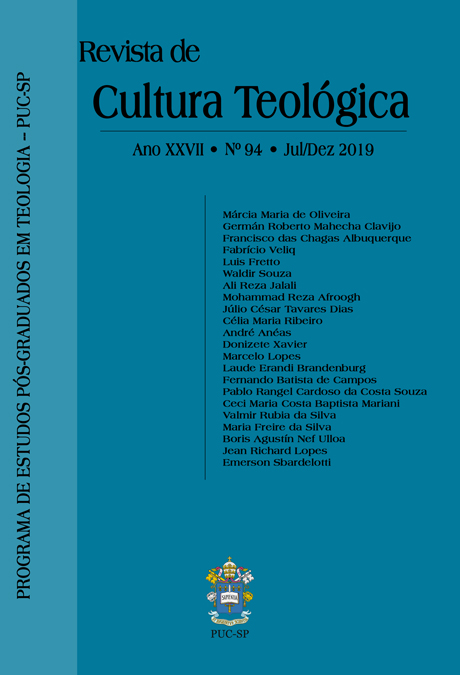The tenderness: the great revolutionary project
DOI:
https://doi.org/10.23925/rct.i94.44490Keywords:
Violence, Barbarism, Tenderness, Revolution, IdeologiesAbstract
We live in a time when humanity is accustomed to the cruel and inhuman news, in which the production and trade of weapons prevail, generating various types of violence. Finally, it has become a place where the law of the strongest rules barbarism, a law that distributes inhumanity, suited to the mold of particular selfishness. Violence becomes explicit in a fragile and totally vulnerable society through multiple ideological faces that promise quick solutions. However, if there is a frightening side to violence in society, there is also the profound solidarity and cooperation that are continually highlighted in social life. This article presents an element proper to the human being, tenderness, which from his awareness is presented as a harmonious and affective solution in the different divergences regarding the scope of human coexistence. In this perspective, they propose a revolutionary project, “that can put people back at the center”, renewing the hope of a happy future, the result of kindness, kindness and civility. The aim of this article is to clearly express the relevance of “tenderness” as a primordial element of justice, which knows how to distinguish good from evil, which drives us through solidarity with the rescue of the dignity of others, affected by human fragility. The methodology used was the qualitative bibliographic research. The feeling of tenderness was analyzed from an anthropological study, whose contents added to the experience of faith shed light on the theological value. The society of the third millennium is expected to show, in place of a culture of violence fueled by selfishness and death, a culture of tenderness offered to the whole society, of love and life. Only in this way, in the sense of the reunion with the sense of tenderness, can the triumphalism of ideologies, of enlightenment be reversed, by the sense of hospitality, the appreciation of difference, the loving respect for nature and the environment. The methodology used was the qualitative bibliographic research. The feeling of tenderness was analyzed from an anthropological study, whose contents added to the experience of faith shed light on the theological value. The society of the third millennium is expected to show, in place of a culture of violence fueled by selfishness and death, a culture of tenderness offered to the whole society, of love and life. Only in this way, in the sense of the reunion with the sense of tenderness, can the triumphalism of ideologies, of enlightenment be reversed, by the sense of hospitality, the appreciation of difference, the loving respect for nature and the environment.References
BORRIELLO, E.; CARUANA, E. Dicionário de Mística. São Paulo, Paulus: Ed. Loyola, 2003.
DAMÁSIO, A. O. Mistério da Consciência: do corpo e das emoções do conhecimento de si. São Paulo: Companhia das Letras, 2000.
GALIMBERTI, U. Dicionário de Psicologia. São Paulo: Ed. Loyola, 2010.
FORTE, B. À escuta do outro: filosofia e revelação. São Paulo: Paulinas, 2003.
GAYOL, M. N. (Ed.). Um Espacio Para La Ternura: Miradas desde la Teologia. Madrid: Universidade de Comillas. 2006.
GRABNER-HAIDER, A. La Bíblia y Nuestro Lenguaje. Barcelona: Ed. Herder, 1975.
LALANDE, A. Vocabulário Técnico e Crítico da Filosofia. São Paulo: Martins Fontes, 1999.
LEVINAS, E. Totalidade e Infinito. Lisboa: Ed. Biblioteca de Filosofia Contemporânea 70, 1980.
PAIVA, J. G.; ZANGARI, W. A Representação Na Religião; Perspectivas Psicológicas. São Paulo: Ed. Loyola, 2004.
RENAULT, A. O indivíduo. Reflexão acerca da filosofia do sujeito. São Paulo: Ed. Difel Brasil, 1998.
ROCCHETTA, C. Teologia Da Ternura: Um “Evangelho” A Descobrir. 2° E. São Paulo: Paulus, 2006.
ROGERS, C. R. Um Jeito de Ser. São Paulo: E.P.U. 1983.
ROF, J. Fronteras vivas del Psicoanalisis. Madrid: Ed. Karpos, 1975.
KONRAD, L. Os Oito Pecados Mortais do Homem Civilizado. São Paulo: Ed. Brasiliense, 1988.
ARTIGO DE REVISTA
HOLANDA, A. (Org.). Reflexões sobre Solidariedade, Educação e Postura de Vida. Psicologia, religiosidade e fenomenologia. Campinas, São Paulo. C. 8. 04-4792, p. 147-165, 2004.
ARTIGO SITE
EDUCARIS. Papa Francisco: "Revolução da ternura" e "humildade. Comissão Episcopal da Educação Cristã e Doutrina da fé Fundação Secretariado Nacional da Educação Cristã. Disponível em: http://www.educris.com/v3/326-vaticano/6858-papa-francisco-revolucao-da-ternura-e-humildade. Acesso em: 27 mar. 2018.
OFS. Ordem Franciscana Secular do Brasil. Mudamos o mundo com a revolução da ternura. Disponível em: <http://www.ofs.org.br/noticias/item/1099-mudamos-o-mundo-com-a-revolucao-da-ternura>. Acesso em: 27 mar. 2018.


